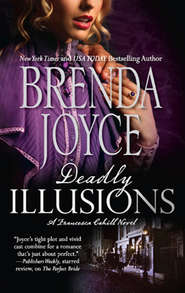По всем вопросам обращайтесь на: info@litportal.ru
(©) 2003-2025.
✖
Deadly Kisses
Автор
Год написания книги
2019
Настройки чтения
Размер шрифта
Высота строк
Поля
Francesca quickly knelt and pulled the throw over Daisy’s face. “I do need to get the police. There has been a murder, and they must be notified. But I don’t want to leave you here alone, Rose.”
Rose sat abruptly on the sofa, her face collapsing into tears again. “Who would do this? And why? Oh, God why?”
Francesca sat besides her, her mind beginning to function fully again. She had received Rose’s note a good half an hour ago, a few moments before midnight. Betty had said the note had been dropped off at the house just a few minutes before they arrived home. The trip uptown from Daisy’s house was thirty minutes in light traffic, so Rose had sent the note around eleven-thirty. “Rose? Can you answer a few questions?”
Rose looked up. “Are you going to find her killer? The police won’t care. I don’t trust those flies.”
Francesca hesitated, recalling Daisy’s hostility the last time they had spoken, and Rose’s own hatred of Hart for taking Daisy away from her. But how could she refuse Rose, who had loved Daisy so? “Yes. Yes, Rose, I will take the case.”
“You will take the case, even though you hated her?”
“I didn’t hate her, Rose. I was afraid of her.”
Rose jerked, meeting Francesca’s gaze. Slowly, she said, “All right. What do you want to know?”
“What happened here tonight? When did you find her?”
Rose swallowed. “I don’t know. I was out for the evening. When I got here, the house was dark, I knew some thing was wrong! I called for her, but she didn’t answer.” Rose stopped, for out in the hall, a soft bump had sounded.
Stiffening, Francesca looked at the open door, as did Rose. The hall beyond was lost in shadow and she saw nothing. But she had heard a noise—someone was present.
Francesca stood. “Where are the servants?”
“The butler sleeps in his room behind the kitchens, as does the maid. The housekeeper goes home at five.” Rose was ashen and wide-eyed now.
“Did you go below stairs when you came home?”
Rose shook her head. “No. I was about to go upstairs when I saw the light coming from this room.” Her mouth trembled and she glanced at Daisy’s covered body. She inhaled, clearly fighting more tears.
“Wait here,” Francesca said. She glanced at the desk, saw a letter opener and took it. Then she changed her mind, putting it back and taking a crystal paperweight instead. After what had been done to Daisy, she did not think she could stab anyone. Clutching the paperweight, she left the study. The corridor outside remained dark and every blond hair on her nape prickled with dread and fear.
Someone was lurking in the corridor leading to the kitchen and servants’ quarters. But it would make little sense for that someone to be the killer, who must have long since fled. It was probably just a servant.
On the other hand, murderers often defied every possible assumption one might make about them.
Francesca took a deep breath for courage, once more wishing she had her gun, and she started forward, trying to make as little noise as possible. She heard footsteps approaching—each footfall slow and cautious. She froze.
Her grip on the paperweight tightened. She debated turning to flee, but in a moment whoever was beyond her would appear and see her. Instead, she pressed against the wall, waiting. The shadowy form of a man appeared, carrying a candle. He saw her against the wall, halted in midstride and lifted the candle higher.
Francesca was illuminated—but so was he.
Standing there in the hall was her fiancé.
CHAPTER TWO
Tuesday, June 3, 1902—12:45 a.m.
FRANCESCA WAS DISBELIEVING. Hart was the very last person she had expected to see. What was he doing in the city?
And then she saw the dark stain on Hart’s white shirt, where his suit jacket was unbuttoned. “Calder?”
He hurried toward her, his own surprise fading. “Francesca!” he exclaimed, and his expression changed, becoming displeased. “Why am I not surprised to find you here?”
“Are you hurt?” she demanded, but the beginnings of a terrible fear had crept into her mind. Somehow, she knew the blood was Daisy’s. She stiffened, staring up at his dark, handsome face.
“I’m not hurt.” He took her arm, as if to steady her. “Daisy is dead, Francesca.”
She met his probing regard, her mind scrambling to sort through the confusion. “I know.”
“The blood is hers, Francesca, not mine. I found her in the study. She had been stabbed.”
Their eyes met. All of Francesca’s shock suddenly vanished. He was supposed to be in Boston. When had he returned to town and why hadn’t he called her? What was he doing here at Daisy’s, in the kitchen and servants’ quarters? Given the blood on the front of his shirt, he had held Daisy, too, the way Rose had. Some thing sharp and distasteful filled her: dread. “Calder, Rose said she found Daisy. In fact, she sent me a note asking me to come here.”
“When I arrived, Rose wasn’t here.” His regard held hers. “I found Daisy on the floor of the study, very much alone.” He looked away from her now. His composure was usually rock solid, but Francesca saw that he was struggling to maintain it. “She was already dead.”
Francesca swallowed, feeling ill. “You checked for a pulse?”
He met her gaze. “Yes.”
Francesca felt as if she were interrogating a suspect. Of course, that was not the case. “When did you arrive here, Calder?”
His look was sharp. “I left my home around eleven,” he said. Then, softly, with warning, he added, “I do not want you involved, Francesca.”
Francesca’s tension rose. She was already involved, because Daisy had once been Hart’s mistress, because she had once been Francesca’s friend and because she had recently been her rival.
“Francesca,” he said, his tone pointed, and he took her wrist.
She looked into his eyes. “Daisy is dead, Hart. She has been murdered. I think we are both involved.”
He turned away, but not before Francesca saw the anguish in his eyes. She was shocked. Had she imagined it, or did Calder have some feelings for Daisy still, after all of this time?
He slowly faced her. “You are staring.” His tone had softened and his hand slipped to her palm. “Francesca, I am also in shock. We had better summon the police.”
Her heart raced with painful force. If she had seen anguish in his eyes, it was now gone. He seemed grim, but not grief-stricken. Of course he would be distraught that a woman he had once known intimately was dead. “Calder, what are you doing here?”
He hesitated, his expression hardening. “I finished my affairs in Boston earlier than expected. I arrived at Grand Central at a quarter to seven this evening.” He met her gaze directly. “After I found Daisy, I decided to look for the killer. I was about to do so when Rose came into the house. She was not wearing any wrap—clearly she had just stepped out. I hid. She went directly to the study, Francesca, directly to Daisy. I followed her. She was not surprised to see Daisy murdered.”
Francesca’s mind raced. Calder had not answered her question. He had not told her why he was at Daisy’s in the first place. Any affairs that remained between him and Daisy were of a financial nature. Such concerns could have waited. It was well after midnight now.
If he had left his uptown home at eleven, he would have arrived at Daisy’s perhaps an hour ago. What had he been doing in the house for all of that time? Her pulse quickened with fear. She did not have to be thinking all that clearly now to know that Hart could be in trouble with the law. “And then what happened?”
“I left her and went to search the house.” He released his hand from hers and tilted up her chin. “You’re upset. I am, as well. We’ll get through this, Francesca.”
Francesca tried to smile at him and was fairly certain she had failed. “Of course we will. But Daisy is dead, Calder. As malicious as she was toward me, toward us—she did not deserve to die, and certainly not so violently.”
His face tightened and something dark and deep flared in his eyes. “No. As much trouble as she caused us recently, she did not deserve to die.”
Suddenly Francesca recalled that day last month out side of the church. After taunting her, Daisy had walked away. Hart had come outside, the memorial service over. He had been grim and resolute, and he had told her in no uncertain words not to worry.

















